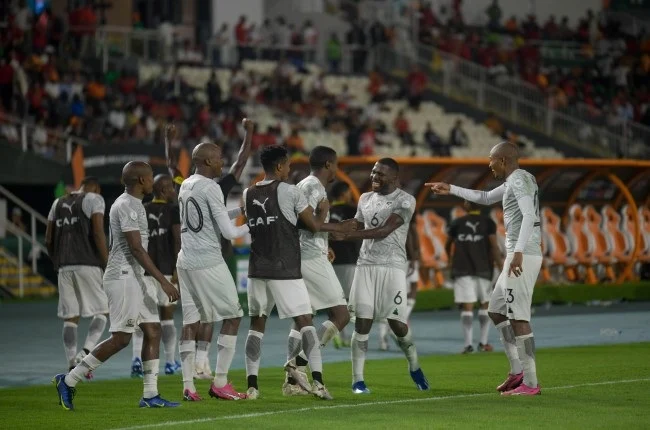- In previous years, Bafana Bafana experienced players rejecting call-ups, openly stating they weren’t willing to be backups.
- Under the leadership of the Belgian coach, a sense of brotherhood now binds the team, with no player considering themselves greater than the team or others.
- Broos fostered this unity by instilling accountability and empowering players to take control of their team.
Despite potential grammar errors, Kermit Erasmus effectively conveyed his message when Shakes Mashaba called him up in 2015 as a replacement for Thamsanqa Gabuza in the Bafana Bafana squad.
Erasmus declined, asserting to Mashaba and the nation that, as a striker with a single season of double-digit goals, he wasn’t a backup player. His stance was not unique, as players like May Mahlangu and Thulani Serero also rejected Bafana Bafana call-ups. Although Mashaba attempted to stand firm, the South African Football Association pressured him to reverse the blacklisting of Mahlangu and Serero, undermining his authority.
Mashaba reluctantly reconciled with Mahlangu and Serero, allowing their return to the squad. This association’s concession to players set the stage for Erasmus to defiantly reject Mashaba and the country. Serero had faced similar issues with Gordon Igesund, leading to his expulsion from camp in Durban for expressing reluctance to risk injury in a World Cup qualifier.
In 2024, a once-considered “back-up” player, Evidence Makgopa of Orlando Pirates, emerged as a star in Bafana’s Afcon journey, now on the brink of the semi-finals. Makgopa’s transformation showcases Coach Hugo Broos’s impact, turning Bafana from underdogs to tournament contenders, evident in their ousting of top-ranked Morocco.
As they face Cape Verde, Makgopa’s integral role and Broos’s influence mark a significant shift for Bafana. No longer mere dark horses, they’ve become a team to watch after defeating Africa’s No. 1 team. Captain Ronwen Williams notes the collective support, even from absent players like Lebo Mothiba and Lyle Foster, reflecting the team’s newfound unity and success.
Broos fostered a unified spirit by treating everyone equally and maintaining a firm stance. He demonstrated this by holding star player Percy Tau accountable, refusing to excuse him from a crucial friendly after playing for Al-Ahly a few days earlier, a departure from the usual practice of shielding star players.
Traditionally, Bafana coaches protected star players, contributing to a culture of entitlement. Overseas-based players, in particular, often left camp disgruntled after traveling to South Africa during international breaks, only to find themselves on the bench. This unequal treatment created sulking attitudes, overshadowing the contributions of the players on the field.
Under Broos, the current Bafana squad operates in an equitable system where no one feels entitled to a position. On the bench, players actively support and provide instructions, fostering a collaborative environment both on and off the field.
Zakhele Lepasa shared with iDiski Times, “Around 10 or 11 of us are on the bench. We function as coaches in addition to the official coaching staff. The camaraderie is palpable even when playing or coming on as a sub. This dynamic significantly boosts team morale. Our collective hard work and mutual encouragement within the group are what make it special. No one here considers themselves a big player; we all listen, provide advice, and work collaboratively. This ethos has been evident in our performance so far.”
Under Broos, Bafana’s Afcon campaign is anchored in unity and humility, lessons learned from his time in Cameroon in 2017. Faced with star players refusing call-ups, Broos assembled a squad of dedicated individuals who respected the badge, ultimately becoming champions.
Facing a similar situation when Foster opted out but continued with Burnley, divisive opinions emerged. Some understood Foster’s mental health prioritization, while others, recalling past refusals, deemed him unpatriotic. Broos, having experienced player resistance, proceeded without Foster and excluded others like Njabulo Blom before the tournament due to perceived lack of commitment.
While unity was vital, Bafana adapted their playing style after a 2-0 defeat to Mali, opting for a more pragmatic approach, exemplified against Namibia. The team prioritized effectiveness over flashy football, adopting a direct style, especially evident against Tunisia. Broos acknowledged the challenge of playing at the highest level, emphasizing the team’s need to adapt in their new Afcon context.
This is a novel experience for us; we’ve never competed at this level before. Perhaps that’s why some might argue we haven’t displayed an exceptional style of play. However, in the context of Afcon, the crucial aspect is the upcoming match. The journey to success matters less than the results achieved. Across the three group stage matches, we aimed to employ different strategies. Our primary focus is to secure our place here.
Personally, I don’t prioritize post-game compliments about playing well. I’d prefer people to say, ‘They’ve advanced to the next round,’ rather than praising our performance.
